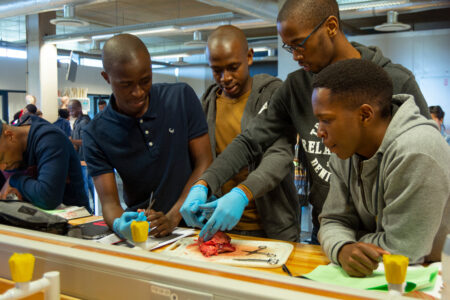A PhD is often seen as a smart career investment — a pathway to higher-paying jobs and career growth. And this fact is true everywhere, including in South Africa. According to the DSI-NRF Centre of Excellence in Scientometrics and Science, Technology and Innovation Policy, only 2% to 3% of postgraduates fail to find jobs after graduation with a PhD.
But having a PhD is not just about boosting employability. PhD graduates drive national progress, advancing knowledge that fuels economic growth and improves lives. In South Africa, this is a national priority, aiming to produce more than 100 doctoral graduates per million people annually.
For aspiring PhD candidates, South Africa offers the support and environment for advanced study. Nelson Mandela University, ranked among South Africa’s top six universities, is an excellent starting point. With over 500 programmes across seven faculties, its PhD degrees prepare researchers to lead in their fields.

Regardless of your background, all students are trained to treasure knowledge and never stop learning. Source: Nelson Mandela University
Academic excellence
Nelson Mandela University is committed to fostering a dynamic culture of research, scholarship, and innovation. This provides students with the opportunity to learn from a highly-ranked university with international accreditation, equipping them with the skills and knowledge needed for success.
Its Faculty of Science, for example, offers a wide range of undergraduate and postgraduate pure and applied science programmes, structured into specialised clusters, including Life, Earth, Environmental, and Agricultural Sciences, Physical Sciences, Mathematical and Computational Sciences, and more. They are led by South African Research Chairs Initiative (SARChI) chairs and National Research Foundation (NRF)-rated scientists who adopt modern ways of learning and teaching, as well as research and engagement.
Research that creates lasting change
No matter your field of study, PhD programmes here provide you with not just the means to conduct research but also the skills to address real-world, global challenges. Dr Mia Strand, an Ocean Nexus Postdoctoral Research Fellow at the Institute for Coastal and Marine Research, undertook ocean governance research during her PhD. Her work focused on inequality and inequity and explored the value of arts-based participatory research with Indigenous and local community members for more equitable and inclusive approaches to marine spatial planning in South Africa.
Similarly, Itumeleng Zosela, a PhD candidate in Physiology specialising in Nanomedicine, developed plant-based gold nanoparticles as a cost-effective and safer alternative to existing colon cancer treatments. It’s poised to be a more affordable alternative to current treatments, which are more expensive and associated with severe side effects.
The University’s commitment to research excellence is backed by state-of-the-art facilities. The Centre for African Conservation Ecology addresses biodiversity and conservation challenges, while the Centre for High Resolution Transmission Electron Microscopy enables atomic-level analysis of materials.
PhD candidates here benefit from extensive funding opportunities too, such as Postgraduate Research Scholarships, the Research Development Fund, and more. Partnerships with regional and international universities and development institutions further elevate the quality of research, offering students exposure to global development challenges and solutions.
Adding to this support system is the Transdisciplinary Institute for Mandela Studies, which focuses on critical Mandela studies, documentation, postgraduate research, community engagement, and the development of national and international networks.

Mandela University shapes graduates to be responsible global citizens, with the skills to think critically, innovate, and adjust to new challenges. Source: Nelson Mandela University
From insight to action
Nelson Mandela University ensures that its graduates have the leadership and conflict resolution skills, as well as the ethics, to face any challenge head-on.
For instance, Strand’s research revealed how women are excluded from ocean decision-making processes. This finding has since inspired her to advocate for greater inclusion and equity in ocean governance, empowering marginalised voices to have a say in critical environmental decisions.
Zosela is using her research to drive advancements in cancer treatment while mentoring the next generation of scientists. As a mentor for the Eskom Expo for Young Scientists, she helps young learners develop problem-solving and science communication skills. She participates in outreach programmes to inspire students, especially young women, to pursue careers in STEM as well.
These stories tell us something graduates have long known: this is a university that transforms students to lead, innovate, and make a lasting difference in the world.
Follow Nelson Mandela University on Facebook, X, Instagram, YouTube, and LinkedIn












